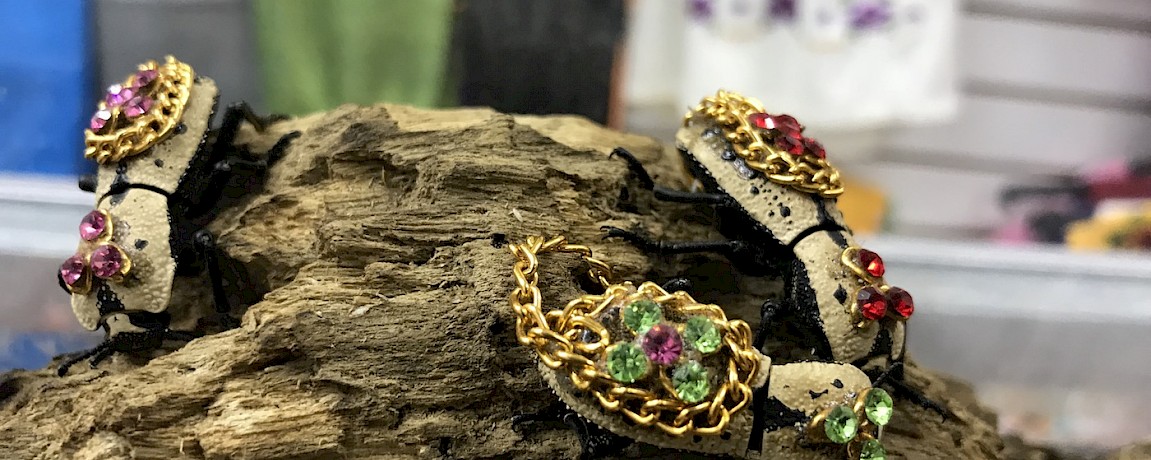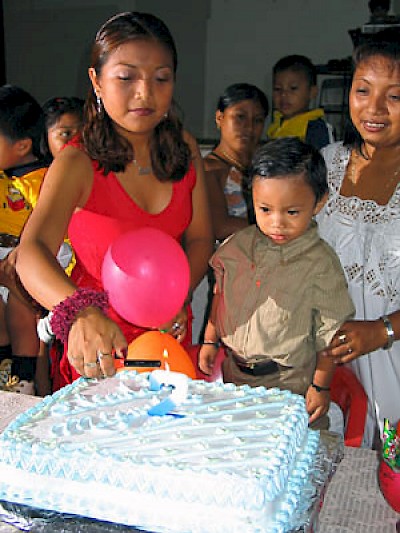What's in a (Spanish) Name?
If you aren't an aficionado of all things Mexican (which we weren't when we first moved to Yucatan), during your first few months of living here, you will meet people with names that are unfamiliar. Some of them are cute, some are funny and some are just downright odd.
Let's start with Spanish names. In our pre-Working Gringo days in California, we were familier with names like Jose, Jorge or Maria because California roots are, after all, Mexican. We suspect that perhaps many of the Mexicans we came in contact with may have adopted these more normal Spanish names to make life easier for themselves.
Upon immersing ourselves in Yucatan, we were confronted with names like Socorro, Izauro, Santiago and Ignacio... names that were definitely new to us. Some of these names (like the ones just mentioned), we found rather beautiful. Working Gringa's Spanish name is Elena, yet another beautiful name. But Working Gringo's name translated into Spanish has not been quite so painless. While "James" is a perfectly fine name in English, the Spanish version of James (pronounced "Hah-mess") is rather uncommon and not quite so pleasing. What's more, the alternative of Jaime always raises a chuckle from our Spanish-speaking friends - we're not sure why. Apparently, Santiago also means "James" and Working Gringo has found that much more amenable.
Of course, if you don't like your name, there is always the option of a nickname. Nicknames are popular here, but connections to their antecedents have not always been obvious to us. Here are some Mexican nicknames that we have run across and the "given" names that they are related to:
- Jesús (a common name here) becomes Chucho
- José becomes Pepe
- Ignacio becomes Nacho
- Socorro becomes Soco or Coco
- Maria Elena becomes Malena
- Eugenia becomes Genny (pronounced "Henny")
- Beatriz becomes Betty
- Concepcion becomes Conchi
- and so on...
Then there are the stranger dimunitives. There is a popular hardware store in the Yucatan named Boxito. From our Mayan language studies, we have learned that box means "black" and the Spanish suffix -ito means "little". As it turns out, we were right! Boxito is a nickname given to a little guy who has dark skin. It is a dimunitive name, given out of affection or familiarity, not out of disrespect. And it was probably the nickname of the man who started this very successful chain of stores. Other dimunitives in that vein are Flaco (skinny man), Gorda (fat female), Gordita (little fat female), Guera (white woman), Guapo (handsome man), Rubia (blonde woman). And of course, just change the "a" to "o" or vice-versa, and the name gets a sex change. Fun and easy!
While we're on the subject, the habit of adding dimunitives to names is a charming one and we're not sure how we lived without it before now. Mama becomes mamacita, abuelo becomes abuelito, gata becomes gatita and the list goes on ad infinitum. If you work at it hard enough, you can add -ito or -ita to almost anything and that thing is suddenly little, cute and endowed with charm and endearment. Of course, this is also used for names: Lupe becomes Lupita (at least one cafe in every town in Mexico is Cafe Lupita), Estrella becomes Estrellita, Angel becomes Angelito, etc.
But our favorites are the names we would never have thought of in a million lifetimes. Our assistant, the Amazing Beatriz, has told us about people she has met (more than one!) named Annirev. We pondered over that for a few minutes when we heard it but she finally had to tell us that it is the abbreviation for Anniversaire de Revolución (The Anniversary of the Revolution), which is the way the holiday on November 20 is often presented on a calendar.
We ourselves have met more than one young woman named Leydi Diana. All the Leydi's we have met seem to be in their early twenties... hmmm! Certainly not a coincidence.
The Amazing Beatriz also told us about a story she read in the local paper a few years back. There was a local whose name was Onecent (pronounced "OHN-neh-sent"). We puzzled over this one too but she told us not to bother. The story was that the father of Onecent had been out in the milpa (corn field) one day, and he had found a coin on the ground. On it, the coin had the letters ONE CENT and when his son was born later that day, he was so named. He could have been named Ingodwetrust ("een-gohd-WAY-troost") but that probably didn't trip off the tongue quite so lightly.
When we were researching this article, we found a story from last summer about the Mexican government cracking down on "strange" baby names, trying to save their little citizens (paisanitos?) from future embarassment in the schoolyard. Apparently, inventive names are a Mexican tradition and a custom that we think is rather endearing. Adorable. Charming. It's a customita! (Okay, so it doesn't work all the time...)
Have you heard any interesting names here in the Yucatan? Please tell us... we're fascinated!









Comments
lizzy(elizabeth) 17 years ago
i have no clue how to say my name in spanish i am stuying it all by myself because i have always been interested in it and i have learned alot i filled out a notebook on spanish words i havent yet leaned it but bt teaching myself i have learned but i have not one clue how to say elizabeth or lizzy in spanish could someone tell me??
Reply
A clarification for the name James 17 years ago
You are all correct about the fact that James is a variation of Santiago in spanish. You can actually find out that the Letter of James in the New Testament is "Carta de Santiago" in spanish.
Here is why (according to a pastor that once explained this to us) Jacob or Jacobo was the younger brother of Jesus and he wrote this letter. He apparently lived in Tarsis (Spain) for a while and he was known there as San Jacobo (San is for Saint) it got transliterated over the years becoming Sangiaco>>> Santiago>>>> San Diego. In English, Jacob was simply translated as James.
If there is an incorrect statement here please let me know.
Javier
Reply
Manny 17 years ago
I live in San Antonio, TX. I love the Yucatan and this site. I am in the insurance business and run across many NEW names on a daily basis. I must say that all cultures are just trying to be original while naming their children. We have the black folks with names such as Lakisha, Shevonda, Kanyatta, Shatoree, LeShawn, etc. OOHHHHHH and I have a white customer whose name is Barbie Girl Cox. Poor thing.
Reply
Tracy 17 years ago
I'm Caucasian American but my husband is from El Salvador. Everyone had so much trouble with my name. It would be pronounced "Tr-lacy" - with a random "L" thrown in. I don't know why since it's made up of 2 easy Spanish words "tres" "si" (three yes -- sounds dumb in Spanish.)
I considered calling myself "Theresa" when around in-laws but my husband said I should just leave my regular name. Besides being called "chelita" (on rare occasion for my fair skin), and "gordita" (until my husband told them most Americans don't find it endearing. LOL.) ... I have just been "TrLacy" ... And I so wanted to be called "Traicita" .... ah well.
Reply
Kathe 18 years ago
Here in Chetumal:
Eusebio is Chebo
Mercedes is Meche
Veronica is Vero
My construction crew consists of Pollo, Chaparro, Chucho, Flaco, Tiliquis, Polo, Guero (don't know where to find the dieresis), Moreno, and Pablo (whose real name is Angel Armin)...The engineer is Miguel whom they call Inge and the architect is Shiva (real name Ricardo) whom they call Arqui...Go figure...
And I am Doña Katy
Reply
Susam 18 years ago
My Mayan family in the Yucatan pronounce my name Susan as Susam, and of course Susana.
A person with the name Faustino had a diabolical role during my life in Merida. And people with old testament names like Eneas, Isaias, Eleazar, among others brought meaning to those times. The ultimate in sweetness, Dulce Maria still represents all goodness Maya.
Joy of nostalgia reading your website...
Una golondrina viajera
Reply
Josep 18 years ago
Hi everybody, this is my first post here. Thank you all for your interesting posts. As you could see my name is Josep, catalan translation of José. Just to comment that Pepe doesn't stand from padre putativo. The most serious theory about that, is that it has to do with the Italian word for Jose: Giuseppe. In the south of Spain woman's say: "Pepe se llama mi padre, Pepe se llama mi hermano y Pepe se ha de llamar quien a mà me dé la mano".... more or less: Pepe is my father's name, Pepe is my brother's name and Pepe is the name of who will marry me"..
You could find here all the meanings of names in Spanish:
http://www.educar.org/lengua/nombres.asp
Regards from Barcelona, Spain.
Reply
La Coyotita 18 years ago
I have a sister, 'Enedelia', whose apodo is 'Yeya', but other than that my family is just made up of the standards like 'Chepe', 'Lupita' (who is a 'Maria'), 'Chencho, 'Beto' and a 'Linda'.
My own name is rather more Anglo-Saxon ('Elizabeth') and became 'Wichi' (say it wi-TCHY) thanks to my older brother, but I wondered if that was standard, or if there is some other Spanish apodo for 'Elizabeth'?
Reply
Joseph 18 years ago
Hi Becky,
Rebecca has it's Spanish "version", sounds the same, just spelled different (with a single "C").
Susanita is a "cute" way to call "Susana", which is a spanish name already. "Susa" is just a short way to call her.
Cheers ;)
Reply
becky 18 years ago
Hey, my name is Rebecca, can you pronounce that in Spanish? Also is Susanita a full name or a nickname, because in a story I am writing she was called Susa as a nickname because I didn't know all this Spanish name stuff. Thanks!
Reply
Joseph 18 years ago
Hi Lauren :)
Your name is actually a variation of the latin name "Laura", which is somewhat popular already around here, so... nice to meet you Laura!
For your friend Matthew, his spanish name is "Mateo" (matt-eh-oh, with the stress in the "eh")
As for Nathan... well, this is not his lucky day... I can't think of a spanish name for him, but his name isn't hard to pronounce at all in spanish, so it shouldn't be a problem. Just expect it to be pronounced a little different: "Nay-Tan"... even sounds chinese! 8-)
Cheers
Reply
« Back (50 to 61 comments)Next »